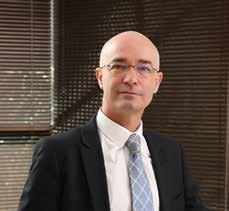
6 minute read
BMG
Opportunity for Africa to fill the commodity gap

Advertisement
Andrew van Zyl director and principal consultant SRK Consulting22

Darryll Kilian partner and principal environmental consultant SRK Consulting

Wouter Jordaan Forecasts suggest that the global economy is facing a ‘commodity gap’ in the near future as the demand for battery minerals could outstrip supply; could Africa be the continent to fill that gap?
There is certainly good reason to see Africa making a valuable contribution to future supplies of mined commodities from lithium, cobalt, nickel and graphite to manganese, iron, copper, chrome, uranium and aluminium, according to SRK director and principal consultant Andrew van Zyl.
While there are considerable resources of these minerals available in Africa and even currently being mined, there remain challenges which prevent their economic extraction – and which are regularly raised and discussed at the Investing in African Mining Indaba in Cape Town. “One of the reasons why the gold sector thrives in many parts of Africa, for example, is because it needs relatively little in the way of national or statemanaged infrastructure,” said Van Zyl.
“For better or worse, a gold mine can operate quite effectively as an ‘island’ of activity and prosperity – providing most of its own inputs to mine and process ore, and to transport the very compact end-product.”
By contrast, many of the commodities that are now growing in demand are bulk minerals that need extensive road, rail and harbour infrastructure – so they can be transported efficiently and shipped to customers from functioning ports.
Planning and developing such facilities require more than capital, he argued. They rely on far-sighted government policies being implemented by wellresourced state bodies – combined with collaboration from the private sector and international funding agencies. They also call for close working relationships between neighbouring countries, with the necessary shared vision and practical protocols to allow railways, powerlines and goods of all descriptions to pass over borders with minimal effort and at the lowest possible cost.
Further, with the African Free Trade Agreement having come into effect, this should also expedite matters. “The start of trading under the African Continental Free Trade Area (AfCFTA) agreement on 1 January 2021 marks the dawn of a new era in Africa’s development journey. Over time, the AfCFTA will eliminate import tariffs on 97% of goods traded on the continent, as well as address nontariff barriers,” says SRK Consulting ESG Partner Darryll Kilian.
There is little question that the minerals of the future are to be abundantly found in Africa, said Ivan Doku, principal resource geologist at SRK Consulting and country manager for SRK Ghana.
“There is still plenty of opportunity for exploration and mining of battery minerals in West Africa, as we have recently been discovering in Ghana,” said Doku. “The country is becoming a very interesting place to explore right now, having not been historically associated with battery minerals. A significant lithium deposit is currently being investigated – the only one so far in West Africa.”
He said deposits like these had attracted considerable foreign interest, and it was likely that more prospective investors would be looking at the region as more data on this project was published.
Van Zyl highlighted that the condition for – and impacts from – large, bulk mineral projects extended not just to physical infrastructure but to communities. Mines with larger footprints and longer supply chains upstream and downstream also affected a wider natural and human environment.
“For these projects to be sustainable in terms of environmental, social and governance (ESG) considerations, developers need to navigate complex terrain related to regulatory compliance and social licence to operate,” he said. “This assumes a level of certainty in the expectations of the host country, as well as a high level of scientific and engineering skill being available to help mines identify and mitigate the related risks.”
He said Africa was gradually developing the capacity to deliver on these requirements, and the continent needed to share the professional expertise that was available across its borders and from the global community.
“It is important to remember that Africa has made great strides in a range of facets, and we are successfully producing a large range of minerals, including bulk commodities,” said Van Zyl. “This is something that few developed economies have achieved and, while SRK is focusing on further improvement in Africa, it is also contributing its expertise to other developed economies that are struggling to establish mining industries.”
SRK Consulting environmental scientist Wouter Jordaan further noted that SRK’s business model is set around collaboration between its global consulting practices to ensure that the needs of its clients are met. As an example, SRK has embarked on a strategic approach of servicing its Chinese clients in Africa, particularly in the Democratic Republic of Congo and Zambia, from its offices in Lubumbashi, Beijing and Johannesburg.
SRK Consulting’s longer-term vision is aimed at establishing a dedicated resource from China in its Lubumbashi office. This provides the opportunity to engage with clients at head office and mine level, thereby providing the relevant expertise required at each level. To strengthen these links, the SRK South Africa, DRC and China team will be attending the Mining Indaba in May and DRC Mining Week in June. The collaborative effort will also look at infrastructure projects within the region.

Ivan Doku
Following 3 months of gruelling underground testing, SKF MUDBLOCK seals the deal
SKF recently secured an order for 600 MUDBLOCK cassette seals after these reliable products delivered excellent results during a punishing underground mining field test over a three-month period. SKF was asked by a long-standing customer, who is a leading supplier of braking systems for off-highway, industrial and underground mining equipment to end-users, to identify particular seals. “Having identified the products as cassette seals, we referenced them to our newly developed SKF MUDBLOCK (MUD11) cassette seals and received a quote from our customer for 300 pieces in Q3 2021,” says Andre Weyers, SKF Product Manager: Seals.
Weyers explains that the name MUDBLOCK is derived from the fact that SKF originally designed these cassette seals for tractor applications in rice planting fields where the seals are submerged in water and mud. Presenting the perfect multi-lip cassette sealing solution, these seals have been specially engineered for heavy-duty jobs and to ensure reliable market-leading performance even in the most stringent and demanding environments.
“Highly confident of the quality and reliability of our MUD11 seals, we managed, after a six-month journey, to convince the end-user to test our cassette seals in their mining application,” continues Weyers. SKF supplied four 165x190MUD11 sample units suited for a specific hub design on mining machines. The punishing wet, muddy, dry and dusty conditions so typical of the underground mining environment proved to be no match for the four 165x190MUD11 sample seals and SKF received an order in March 2022 to supply 600 cassette seal units scheduled for delivery during April 2022.
Weyers points to the fact that for endusers, superior performance, improved reliability, and prolonged service life deliver reduced maintenance and extended uptime for a more productive and profitable operation. “Subsequently, the excellent performance of our MUD11 seals during the field test cemented a solid relationship between our customer and the end-user. SKF’s reputation as a seal system specialist and quality products supplier once again came to the fore. In addition to benefitting from a quality, competitively priced product supplied by a renowned OEM, our customer now conveniently has access to SKF technical support and spare seals in stock,” concludes Weyers.








